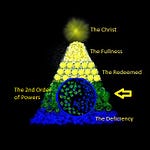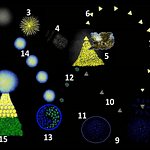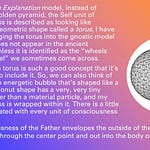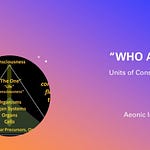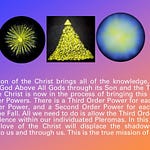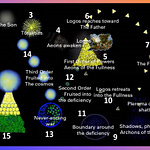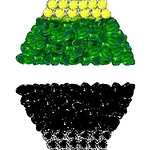Welcome back to Gnostic Insights. You know, this podcast is an odd space where it’s both Gnostic and Christian, because what I’m teaching is what I believe to be the original form of the messages that Jesus was trying to get across. And then the messages that Jesus was trying to get across were co-opted and taken over by the Catholic Church and the Emperor of Rome, who wanted a state religion around 300 AD—that was Constantine—wanted a state religion by which Rome could go out and conquer their enemies. And that’s why Constantine’s vision that supposedly caused him to become a Christian was one of a cross floating in the sky and a voice saying, “By this sign, go out and conquer.”
Well, that isn’t what Jesus was about. That may be what the Pope and the Emperor of Rome are about, and that is this religion called Christianity. But Jesus came for an entirely different process and message. It’s important to remember that Jesus was a Jew, a devout Jew who knew his scripture. So when Jesus makes comments, it’s usually in relationship to the original Pentateuch or the Torah. We modern people have inherited a kind of Gentile religion, mostly formed by the Apostle Paul, who was not one of the original disciples.
When people tune into Gnostic Insights here, they are hoping for, ooh—Gnosticism. And usually the Gnosticism that’s presented when you go out there and you do your research and listen to other Gnostic podcasts, and you go to Wikipedia and read about Gnosticism, isn’t what I’m teaching. But, of course, I maintain that this is the Gnosis that we need to know. This is Gnosticism, and it comes from the same period of time as the other Gnostic scrolls, because it was contained within the Nag Hammadi Scriptures, buried in the desert for 2,000 years. But this one’s usually tossed aside, because people say, oh, it’s too complicated, it’s too complex. But I think it’s because it’s true, and it has been untouched.
Now we do know that Carl Jung was very familiar with the Tripartite Tractate of the Nag Hammadi, because Jung actually purchased the codex upon which this Tripartite Tractate was written. In other words, he bought one of the scrolls out of the Nag Hammadi collection and had it translated. And then, what do you know, out pops Jung’s theory of transpersonal consciousness and Jung’s theory of Depth psychology, which is based upon things like archetypes and dreams. It’s based upon this higher source that I’m teaching you, because Jung and I have both taken to this Tripartite Tractate scroll. So he noticed that what was being taught in the Tripartite Tractate very well describes humanity and the three-part nature of humankind. And it was different than what Sigmund Freud had taught him about the three-part nature of humanity, which is simply id, ego, and superego, but without any higher level. So the superego of Freud is not the same as the spiritual dimension that we talk about, or that Jung talked about. Anyway, this is an aside. This isn’t what I’m intending to talk about today.
*****************
I started by saying that this is a funny type of teaching that’s very Christian and yet very, very Gnostic. People have been asking me for more Gnostic interpretations of the New Testament, which I’m very happy to give.
So, you know, there’s four Gospels, what are called the Gospels, or the story of Jesus in the New Testament. The New Testament begins with these four books, the book of Matthew, the book of Mark, the book of Luke, and the book of John. We’re going to start with the book of Matthew, and I’m reading from a red letter edition, which for me is this New King James Version. Unfortunately, David Bentley Hart’s translation is not a red letter edition, so I’m going to have to go back and forth between my King James and Hart.
The first big speech that Jesus ever gave is called the Beatitudes. That’s what it’s called, the name of speech. And there were a multitude of people sitting on the side of a hill, and Jesus began to teach them. And here’s what Jesus said,
Blessed are the poor in spirit, for theirs is the kingdom of heaven. Blessed are those who mourn, for they shall be comforted.
Blessed are the meek, for they shall inherit the earth. Blessed are those who hunger and thirst for righteousness, for they shall be filled. Blessed are the merciful, for they shall obtain mercy.
Blessed are the pure in heart, for they shall see God. Blessed are the peacemakers, for they shall be called the sons of God. Blessed are those who are persecuted for righteousness’ sake, for theirs is the kingdom of heaven.
Blessed are you when they revile and persecute you, and say all kinds of evil against you falsely for My sake. Rejoice and be exceedingly glad, for great is your reward in heaven, for so they persecuted the prophets who were before you.
(The beginning of the Beatitudes, Matthew 5:1-12, New King James Version)
So let me stop there, and let’s take a look at it in Hart and see what he has to say. Hart puts it this way:
How blissful the destitute—[and blissful carries a spiritual, joyful connotation, so how joyful, how blissful the destitute]—abject in spirit, for theirs is the kingdom of the heavens. [And abject refers to being a poor man or a beggar, but with the connotation of cowering or cringing.]
Jesus is saying that when your spirit is extremely depressed, and you are cowering, and you are fearful of approaching God or praying to God because you are so poor in spirit, you know that you have been living in a worldly manner, or you know that you have been extremely disappointed, and it has crushed your confidence in walking the godly path. So “how blissful you are,” he’s saying, when you are in this state, “because yours then is the kingdom of the heavens.” So we have to be all the way reduced.
Our ego has to be completely out of the way, and whatever we thought about what it meant to be spiritual has to be set aside and trampled down by the world, by what it’s done to us, by the demiurge, by other people. Because once you are in that abject state where you can barely even manage to lift your eyes to God, that then is when the kingdom of the heavens comes to you. That is when you are able to perceive the spiritual dimension.
How blissful those who mourn, for they shall be aided. [And in the conventional translation they always say, “For they shall be comforted.”]
And so here’s the thing. When you are mourning a loss—your mother, your spouse, your child, your dog or cat, the dreams you had, a lost career, some horrible, very, very sad, sad thing has occurred, and you are in mourning, you’re crying—take comfort because you will be assisted by the God Above All Gods. That is a state in which, when you open yourself up, you will be flooded with comfort.
If you don’t think that’s true, then you remain closed off. You’re in a closed-down, lying-on-the-floor-in-a-ball kind of state. And you need to open up to the Father in order for comfort to be able to come in, and it will. Remember, these things that Jesus said, he said over 2,000 years ago, and millions upon millions of people have taken especially the Beatitudes to heart and have found comfort.
How blissful the gentle, for they shall inherit the earth.
Now isn’t that interesting, because right now who’s running the earth? It’s not the gentle people. It’s not the meek, as the traditional translation says. It’s the powerful. It’s the big egos. Well, they’re only running the earth for a period of time because, as it says in the Tripartite Tractate, they are allowed to, they are designated to rule just as a matter of convenience, for a time. And they usually think it’s their powerful spirit. I am a senator, I am a president, I am a king, I am better than you. Well, they’re not really better. They’re simply allowed to have this job, but it was through no merit of their own. They’re designated. But the gentle people, and we want to be gentle people, don’t we? The gentle people shall be the inheritors of the earth. When? Well, that we don’t know exactly. Let’s say eventually.
How blissful those who hunger and thirst for what is right, for they shall feast.
And I know that you hunger and thirst for righteousness or for what is right. That’s why you’re here. You wouldn’t be here otherwise listening to me. It says they shall feast on righteousness. You know that 23rd Psalm that I recite to myself at least once every night? It says,
You have laid out a table for me in the presence of my enemies. You’ve anointed my head with oil. My cup runneth over.
The Father lays out a feast for us of righteousness. We walk paths of righteousness for His name’s sake—that’s also part of the 23rd Psalm. So when you are truly righteous and you seek truth, hunger and thirst for what is right, you will be provided a feast of gnosis, a feast of righteousness. Your cup will overflow with gnosis. But you need to truly hunger and thirst for righteousness. You can’t just wander in and wander out or try to work it through an incantation or put magic onto it. That isn’t the way it works. It’s hungering and thirsting for righteousness, not for power, not for control.
How blissful the merciful, for they shall receive mercy.
And this is a basic spiritual law that Jesus is now starting to teach us. The extent that we forgive others, that is the extent by which we are forgiven. The extent that we are merciful to others, that is the measure by which we are shown mercy. So what you put out, you receive. Now there are some types of churches that have used this as a magic formula, and they think that this is the way to “abundance,” usually material abundance. They call that blessings. But those aren’t the blessings that Jesus talks about. The blessings Jesus talks about are spiritual—are peace and comfort and happiness. And they can be found anywhere, even when you have no possessions, when you’ve lost everything.
You know, this multitude that followed Jesus around, they were poor people. They didn’t have estates and farms to manage. For the most part, they were the wretched and the poor. Because when you have nothing, then you are open to receiving spiritual gifts. That doesn’t mean you have to burn everything you own on purpose so that you can become righteous, because it’s not connected at all to your materiality. But the point is that looking for material wealth is a hindrance to spiritual wealth.
How blissful the pure in heart, for they shall see God.
So we need to be pure in heart. We can’t hedge our bets. We can’t say, oh, well, I’ll try this for a while. Well, that didn’t work. Okay, I’m going to try this now. That isn’t the way spiritual growth happens. You need to have a pure heart that yearns for righteousness, that yearns for reunification with the Father.
Remember, according to the Tripartite Tractate and according to this Christian Gnosticism, we are all born with the sure knowledge of the Father. We are the fruit of the Aeons above. We come from above. We remember Paradise. That’s why we expect Paradise on earth, because we remember the Paradise above. If your heart is yearning for the Father and yearning to reunite with the Aeons above, that is pure. That is pureness. That is your motivation. It’s not a means to an end.
Pure in heart is to be simply in the darkness of your prayer closet, yearning for God, yearning to see God. So establish a yearning and a purity for Gnosis. It’s already in you. It’s not something you seek. It’s something you strip away the layers in order to become reunited with.
How blissful the peacemakers, for they shall be called sons of God.
Going after peace is probably the highest political calling that a human can have here on this earth in the system in which we find ourselves. Peacemakers.
How blissful those who have been persecuted for the sake of what is right, for theirs is the kingdom of the heavens.
So, how blissful–that’s a spiritual joy–are you if people persecute you for the sake of what is right. If you were born into a different religion and it’s against the family or it’s against the national law to become a Christian or to speak of Jesus, or let’s say your friends don’t understand what the heck has happened to you. All this talk of purity and righteousness and seeking God, they’re not out there seeking God. They’re out there having a good time. They’re out there living for today. And when you come forward and you reveal that you’re no longer interested in those pursuits, but you are interested in pursuing righteousness and the kingdom of God, they might make fun of you. They might gossip about you behind your back. They will think less of you.
That is not as bad of a persecution as those earlier ones, like if you’re in a nation that doesn’t allow Christianity—then there are people that are still martyrs. Do you know that there’s thousands of Christians around the world in African nations and Middle Eastern nations who are put to death for believing in Jesus? So we have it pretty cushy out here in the United States. Cushy meaning easy, living in the lap of luxury.
The Demiurge doesn’t like the Christian religion, the true Christian religion. The Demiurge doesn’t want anyone seeking after the Father, the God Above All Gods, because the Demiurge wants people only seeking after him. He is the god of this world, and he doesn’t like it one little bit if you say he’s not. And so you may find yourself being persecuted in small and large ways.
You know, during 2020, people were persecuted for their religious beliefs, because if they didn’t believe that it was right for them to take the jab, they were fired from their jobs. That is a form of religious persecution. This is one of the reasons why freedom of thought, freedom of religion, freedom of speech is absolutely essential to pursuing righteousness.
You can’t force people to believe something. You can’t force people to deny what they do believe. Every soul has its own path to reuniting with Gnosis. And if you disagree and you think that the jab saved everybody’s life, well, okay, God bless you for that. But you can’t condemn or persecute people who disagree with you. We all must be free to follow our path in a free nation.
You know, the Demiurge wants to control us with those bonds—those strong strings of control—and free will and freedom of speech, freedom of action, freedom of travel, don’t comport well with the Demiurge’s view of how citizenry should behave. The Demiurge really likes strong control. The Demiurge is fully in line with, well, I guess what we would call communism, where you don’t have freedom of these things. The state decides everything on your behalf. But you know, no matter what the state or the Demiurge is conspiring to do, you, in your home, in your mind, in your spirit, have complete freedom to follow paths of righteousness, to follow paths of peace, to be gentle, to be pure in heart.
How blissful you, when they reproach you and persecute you and falsely accuse you of every evil for my sake.
And of course, Jesus himself was found guilty and put to death for the crime of believing in the Father and believing that he was the son of the Father. And this was considered blasphemy, and he was put to death for it. And the saints — a saint is a person who is pure in heart, who follows these various instructions in the Beatitudes here — they were, and in some countries still are, persecuted and falsely accused of evils that aren’t true at all, and then put to death, or put in jail, or have their property seized, or fired from their job.
Rejoice and be glad, for your reward in the heavens is great, for thus they persecuted the prophets before you.
And the prophets are referring to the Old Testament prophets. You know, a prophet, particularly these Old Testament prophets like Ezekiel, Jeremiah, Daniel, were always criticizing and railing against the power structure. That’s what the nature of their books in the Old Testament are—criticisms of how everything’s going wrong because the people or because the leaders have forgotten God and have forgotten righteousness and are not carrying out the spirit of the law.
But it’s tricky when we start talking about the Old Testament, because when you seek after God and you are praying to the Father, as in, “Our Father who art in heaven, hallowed be thy name,” which is a prayer that Jesus taught us to say, the people of the Old Testament, the Hebrews, the Jews, were attempting to fulfill laws that had been handed down by the Demiurge. Because the Demiurge, remember, controls through strong bonds and rules and laws, and you have to precisely follow those laws. It had nothing to do with the condition of your heart, with the condition of your spirit.
So for people who pray to that God, the Creator God, Jehovah, there’s a confusion between whether or not they’re praying to the Demiurge or whether they are praying to the God Above All Gods. I think you can be a very good Jew, as was Jesus, and when you speak of the Father, you’re speaking of the God Above All Gods. So it’s not as if anyone who is not a modern Gnostic is worshiping the Demiurge, although many people are, but those are the materialists. They’re worshiping the creation rather than the God Above All Gods. They’re worshiping the creator of the creation rather than the God Above All Gods. But we hop right over that God and direct our attention all the way upward. So don’t be looking back to the Old Testament. Be looking up to the Fullness of God.
Well, let me know what you thought of this first foray into the red-letter words of Jesus, and tell me if this is helpful to you.
Onward and upward, and God bless.






